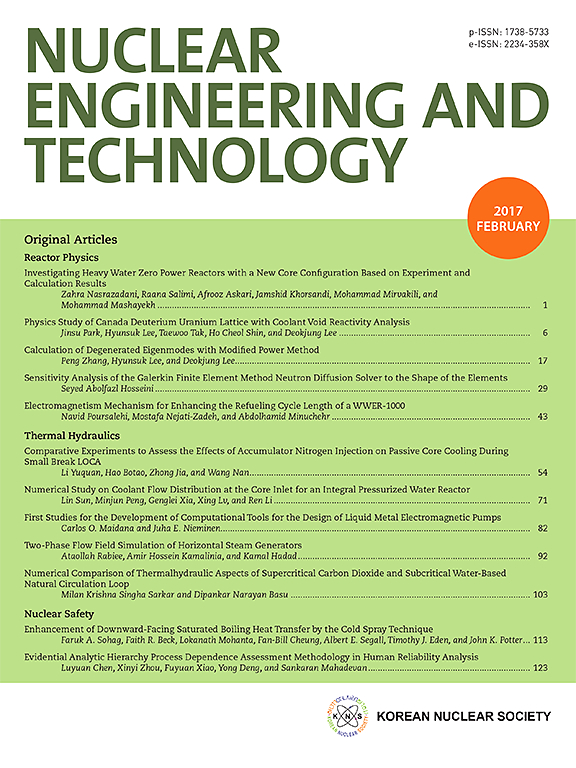Accounting for dependencies among performance shaping factors in SPAR-H using a regularized autoencoder and WINGS-AISM
IF 2.6
3区 工程技术
Q1 NUCLEAR SCIENCE & TECHNOLOGY
引用次数: 0
Abstract
The standardized plant analysis risk human reliability analysis (SPAR-H) method is widely used for human reliability analysis to adjust the nominal human error probability (HEP) by assigning different multipliers to the performance shaping factors (PSFs). Nevertheless, SPAR-H suffers from assuming PSFs to be independent without considering any overlaps and dependencies. Therefore, this study introduces a new systematic method to analyze the relationships among the PSFs in SPAR-H qualitatively and quantitatively to obtain more reasonable HEP estimation results. The proposed method comprises three primary aspects: 1) a regularized autoencoder for the denoising and feature extraction of expert evaluation results, 2) the weighted influence non-linear gauge system-based adversarial interpretive structure modeling (WINGS-AISM) method to analyze the relationships among the PSFs and construct their causal hierarchy, and 3) a new relative weighting system to modify the PSF multipliers based on this hierarchy. The results of experiments comparing the proposed method with conventional methods highlight that our method effectively reduces the double counting of overlapping PSFs in SPAR-H, providing more reasonable and accurate HEP estimation results.
利用正则化自动编码器和 WINGS-AISM 考虑 SPAR-H 中性能塑造因素之间的依赖关系
标准化工厂分析风险人体可靠性分析(SPAR-H)方法被广泛用于人体可靠性分析,通过为性能影响因素(PSF)分配不同的乘数来调整标称人体出错概率(HEP)。然而,SPAR-H 方法存在假设 PSFs 独立而不考虑任何重叠和依赖关系的问题。因此,本研究引入了一种新的系统方法,对 SPAR-H 中 PSF 之间的关系进行定性和定量分析,以获得更合理的 HEP 估算结果。所提出的方法主要包括三个方面:1) 正则化自动编码器,用于对专家评估结果进行去噪和特征提取;2) 基于加权影响非线性规整系统的对抗解释结构建模(WINGS-AISM)方法,用于分析 PSF 之间的关系并构建其因果层次结构;3) 新的相对权重系统,用于根据该层次结构修改 PSF 乘数。将所提出的方法与传统方法进行比较的实验结果表明,我们的方法有效地减少了 SPAR-H 中重叠 PSF 的重复计算,提供了更合理、更准确的 HEP 估算结果。
本文章由计算机程序翻译,如有差异,请以英文原文为准。
求助全文
约1分钟内获得全文
求助全文
来源期刊

Nuclear Engineering and Technology
工程技术-核科学技术
CiteScore
4.80
自引率
7.40%
发文量
431
审稿时长
3.5 months
期刊介绍:
Nuclear Engineering and Technology (NET), an international journal of the Korean Nuclear Society (KNS), publishes peer-reviewed papers on original research, ideas and developments in all areas of the field of nuclear science and technology. NET bimonthly publishes original articles, reviews, and technical notes. The journal is listed in the Science Citation Index Expanded (SCIE) of Thomson Reuters.
NET covers all fields for peaceful utilization of nuclear energy and radiation as follows:
1) Reactor Physics
2) Thermal Hydraulics
3) Nuclear Safety
4) Nuclear I&C
5) Nuclear Physics, Fusion, and Laser Technology
6) Nuclear Fuel Cycle and Radioactive Waste Management
7) Nuclear Fuel and Reactor Materials
8) Radiation Application
9) Radiation Protection
10) Nuclear Structural Analysis and Plant Management & Maintenance
11) Nuclear Policy, Economics, and Human Resource Development
 求助内容:
求助内容: 应助结果提醒方式:
应助结果提醒方式:


